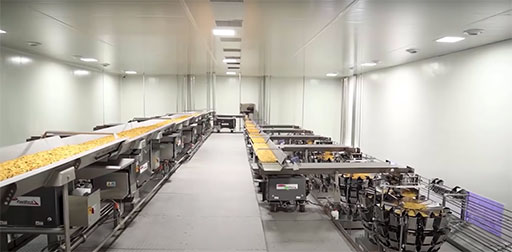Balaji Wafers
“We’ve never cared about sales targets. What matters is delivering the best possible experiences to our customers and channel partners. Salesforce is integral to that vision.”

Balaji Wafers delivers crisp and appetising distributor experiences with Salesforce
In 1981, three brothers hailing from a farming family in Gujarat began frying potato chips in their backyard to sell at a local cinema canteen in Rajkot. Little did they know that this modest entrepreneurial venture – christened Balaji Wafers – would become a Rs 2,000 crore-plus snack food brand with the biggest market share in four Indian states.
“What differentiates Balaji Wafers from the Goliaths of the FMCG industry is that we remain grounded and laser-focused on the consumer,” says Shyam Virani, Director at Balaji Wafers. “You won’t find another brand of packaged snacks that delivers the quality, quantity, and price we do.”
The company is certainly onto something. Their products, which range from the classic salted potato chips to ‘desi’ foods like gathiya and aloo sev, to ‘Indianised’ western snacks like chilli cheese nachos – are the talk of the town.
“Our philosophy is simple – offer the tastiest snacks, and make them easily accessible to the consumer,” says Virani. “We also ensure the freshest products by supplying retailers twice a week instead of the industry average of once a week,” he continues.
Thanks to this consumer-first approach, Balaji Wafers is growing at an impressive 20% year-over-year with 50+ products, 5,000+ employees, three automated factories, and a strong foothold in 12 Indian states.
But it’s their distribution muscle that Virani believes is one of their biggest strengths.
“We wouldn’t be where we are without our 1,200+ distributors and 450,000+ retailers,” says Virani. “They give our products wings.”
Chipping away at data barriers
To help distributors sell easier, Balaji Wafers first built a dealer management system that automated tedious tasks like record-keeping, and improved visibility into billing.
The next step was to help 125+ sales reps manage and audit channel partners more efficiently. At the time, partner surveys and findings were largely subjective, and therefore, hard to analyse. Moreover, data from field visits and audits was scattered across spreadsheets, emails, and text messages, making it difficult to track.
“We needed a solution that would unify, streamline, and transform data coming from our channel partners into actionable insights,” says Virani.
Salesforce Consumer Goods Cloud ticked all the boxes.
“No other platform comes close to Salesforce in terms of sales and marketing capabilities,” says Virani. “It’s stronger, faster, more secure – and therefore, more trustworthy. Plus, we don’t have to worry about updating the platform ourselves to keep up with changing market trends – Salesforce takes care of all that.”
Spicing up sales productivity through better mobility and data visibility
Using Consumer Goods Cloud, Balaji Wafers has streamlined the end-to-end process of managing and auditing distributors and retailers. All interactions with channel partners are now captured on the Salesforce mobile app.
“Earlier, we didn’t know why some distributors were taking longer than others to be onboarded,” recounts Virani. “Now, we can track the entire process - from when a distributor inquiry is received on our website, to when it’s assigned to a sales rep, to all the back-and-forth communication after that, leading up to distributor onboarding. Bottlenecks are instantly spotted and fixed. As a result, distributor onboarding time has reduced by 50%.”
Field sales have also improved. Using Salesforce Maps, the company can identify the GPS locations of all retail stores in an area, and plan the distributor’s sales territory accordingly, re-carving it when new stores come up.
“Using Salesforce Maps has helped us improve the accuracy of mapping our dealer and retailer locations by 80%,” says Virani. Sales supervisors also use Salesforce Maps to coordinate field teams, optimise route plans, and schedule visits to the right channel partners at the right time.
“With smarter field planning, our reps are more productive,” says Virani. “The number of visits to partners has increased by 30% per rep per week.”
At the partner site, reps know exactly what needs to be done using the Salesforce Retail Execution App. All tasks and data around retail audits and surveys can be managed on-the-go. It’s a far cry from the days when audit findings had to be captured on paper, and manually uploaded to spreadsheets.
“Today, field reps have all the data and tools they need at their fingertips, even before reaching a distributor warehouse or retail store,” says Virani. “As a result, audits are faster and smoother.”
Audits have also become more objective and checklist-based. So, the data is easier to compile and analyse.
Sweetening distributor performance with rich insights
Balaji Wafers has built a 360-degree view of distributors – including their sales metrics, infrastructure details, audit results, and potential growth opportunities. These insights are used to help distributors understand how and where to improve their business.
“We don’t just want to sell more products – we want to empower our channel partners to be successful,” says Virani.
Field reps also survey retailers to understand how their service experience can be optimised. One survey found that retailers in busy locations like railway stations want to be supplied six times a week rather than only twice. Intelligence like this enables distributors to serve their territories better, while also improving their own profitability.
The leadership team is also benefiting from Salesforce. They now have a clearly mapped view of sales territories which helps them identify and fix market gaps. They can also use a virtual, 360-degree view of channel partners to have more meaningful distributor conversations. By identifying which distributors are performing the best and why, they can help other distributors improve their game. And with real-time sales insights, they can quickly spot issues in the value chain.
“Earlier, we’d analyse sales trends only at the end of the month,” says Virani. “So, if a distributor’s sales dropped from week one to week four, it would take us 45 days to find out and do something about it. But with Salesforce, sales trends are tracked every week. So, we’re now able to spot and resolve issues in just 15 days.”
A recipe for success
To implement Salesforce, Balaji Wafers enlisted the help of Aethereus Consulting.
“Aethereus was very supportive and flexible, often understanding our needs better than we did,” says Virani. “Having worked with other companies in the industry, they knew a number of best practices that would benefit us. And even after Salesforce was rolled out, they continued to help us improvise and iterate based on user feedback.”
The company wants to now build a pan-India presence where more consumers can enjoy tasty and healthy snacks with an Indian twist.
“We’ve never cared about sales targets,” states Virani. “What matters is delivering the best possible experiences to our customers and channel partners. Salesforce is integral to that vision.”
Keep exploring stories like this one.
Questions? We’ll put you on the right path.
Ask about Salesforce products, pricing, implementation, or anything else — our highly trained reps are standing by, ready to help.












